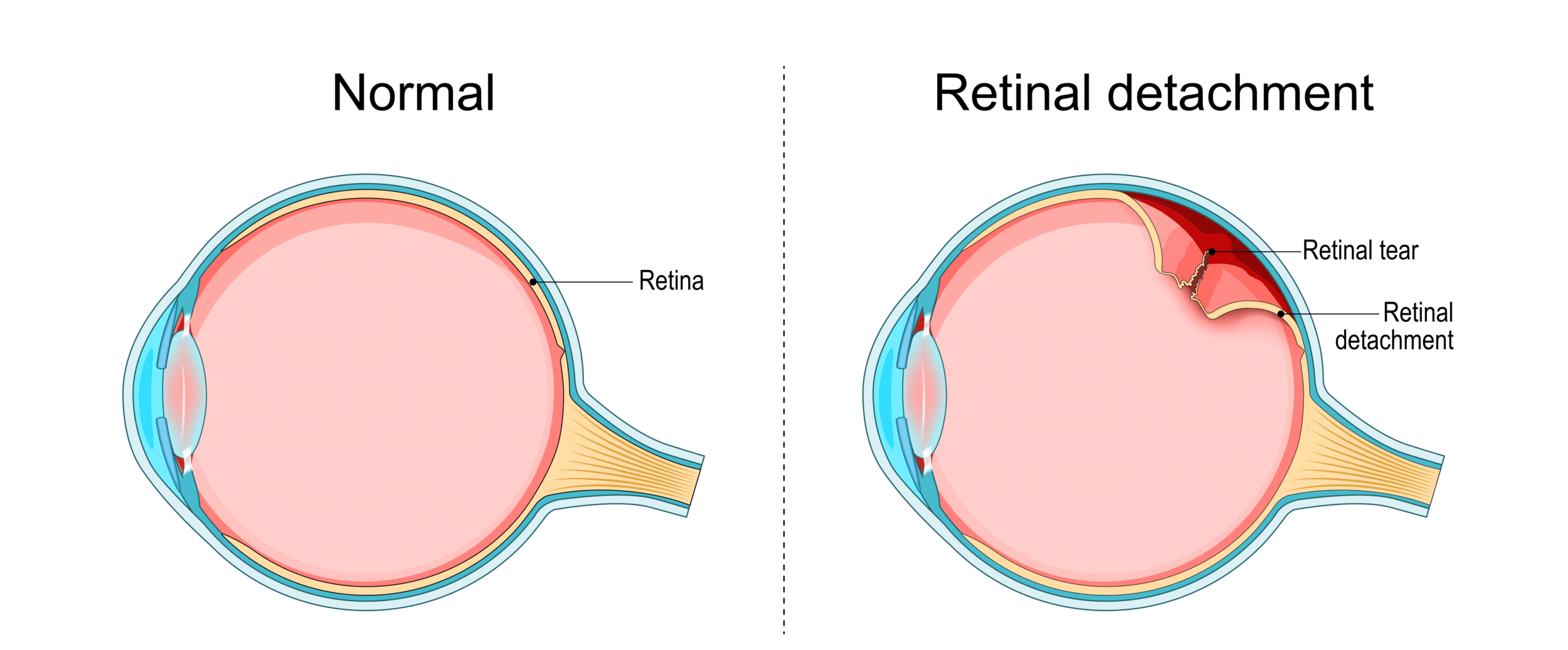At North Suburban Eye Associates, patients can expect friendly and professional service that caters to their needs. Our experienced team of eye specialists understands the necessity of thorough eye examinations that observe every part of the ocular structure, for each fills an important role in lifelong vision.

What Is The Retina?
The retina is a piece of tissue at the back of the eye. It is light-sensitive, transferring rays of light that pass through the front of the eye to the optic nerve. This is the pathway to the brain that results in vision. The retina is multi-layered. The outermost piece of tissue is made up of rods and cones that act as photoreceptors. Rods and cones transform light into electrical signals. At the center of the retina is the macula, which is responsible for central and detailed vision. As integral outgrowths of the developing brain, the optic nerve, and the retina are considered part of the central nervous system.
What Causes Retinal Diseases?
Retinal diseases can affect any part of your retina. The most common conditions that would qualify as a disease would be diabetic retinopathy, macular degeneration, and retinal detachment. Other conditions, such as a retinal tear or a macular hole can be the results of problems that lead to conditions like retinal detachment.
Age-related macular degeneration involves the breakdown of a small portion of the retina called the macula. The causes of macular degeneration are still somewhat a mystery, although it appears to be a combination of heredity and environmental factors, such as smoking, obesity, and diet.
Diabetic retinopathy involves the deterioration of blood vessels in the back of the eye that then leak fluid into and under the retina. This disease is caused by high blood sugar due to diabetes.
Retinal detachment happens when the retina pulls away from the back of the eye. This typically starts with a tear in the retina that allows fluid behind the retina, causing the retina to lift away from the underlying tissue layers. This is caused when the vitreous, the clear, gel-like substance in the center of the eye, shrinks, and tugs on the retina. This change in the vitreous happens with normal aging.
What Are the Symptoms of A retinal Eye Disease?
Although the conditions affecting the retina vary, there is some commonality with the signs and symptoms. They may include:
- Sudden increase in flashes and/or floaters
- Blurred or distorted vision, where straight lines appear wavy
- Defects in peripheral vision
- Lost vision
Risk Factors for Retinal Diseases
Several factors can increase the likelihood of developing retinal diseases:
- Age: The risk of retinal conditions, such as age-related macular degeneration (AMD) and retinal tears, increases with age, particularly after 50.
- Family History and Genetics: A family history of retinal diseases can predispose individuals to similar conditions, including inherited retinal disorders like retinitis pigmentosa.
- Chronic Health Conditions: Diseases like diabetes, hypertension, and high cholesterol can damage retinal blood vessels, leading to conditions such as diabetic retinopathy and hypertensive retinopathy. Autoimmune disorders like lupus and multiple sclerosis can also contribute to retinal inflammation.
- Lifestyle Factors: Smoking, poor diet, excessive alcohol consumption, and lack of exercise can contribute to the development and progression of retinal diseases by increasing oxidative stress and inflammation in the eye.
- Previous Eye Injuries or Surgeries: Past trauma or surgical procedures can increase the risk of retinal detachment or other retinal issues. Severe nearsightedness (myopia) can also weaken the retina, making it more susceptible to tears and detachments.
- Prolonged Exposure to UV Light and Blue Light: Excessive sun exposure without proper eye protection and prolonged screen time may contribute to retinal damage over time.
How to Maintain Your Retinal Health
Maintaining retinal health involves proactive measures:
- Regular Eye Examinations: Routine eye exams can detect early signs of retinal diseases before significant vision loss occurs.

- Managing Systemic Health Conditions: Controlling blood sugar levels in diabetes and maintaining healthy blood pressure can prevent damage to retinal blood vessels.
- Healthy Lifestyle Choices: A balanced diet rich in antioxidants, regular physical activity, and avoiding smoking can reduce the risk of retinal diseases.
- Protecting Eyes from UV Light: Wearing sunglasses that block UV rays can help prevent retinal damage.
Why Choose North Suburban Eye Associates for Retinal Care?
At North Suburban Eye Associates, we pride ourselves on our expertise, authority, and trustworthiness in retinal care:
- Experienced Specialists: Our team comprises highly trained ophthalmologists and optometrists with extensive experience in diagnosing and treating a wide range of retinal conditions.
- Advanced Diagnostic and Treatment Options: We utilize the latest technology and treatment modalities to provide comprehensive care tailored to each patient's needs.
- Patient-Centered Approach: We prioritize patient education, ensuring you are well-informed about your condition and treatment options, fostering a collaborative approach to care.
- Convenient Locations: With offices in Wakefield, Winchester, and Waltham, we offer accessible care to the Greater Boston area.
Protecting your vision is our top priority. If you are experiencing symptoms or have risk factors associated with retinal diseases, we encourage you to schedule a consultation with our specialists. Early detection and intervention are key to preserving your sight.

